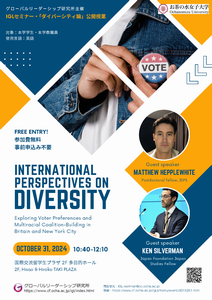- Institute for Global Leadership
- EVENTS
- IGL Seminar “International Perspectives on Diversity: Exploring Voter Preferences and Multiracial Coalition-Building in Britain and New York City”(Oct 31, 2024)
ページの本文です。
IGL Seminar “International Perspectives on Diversity: Exploring Voter Preferences and Multiracial Coalition-Building in Britain and New York City”(Oct 31, 2024)
2024年10月1日更新
IGL Seminar & "Diversity Management" Open Lecture
This lecture considers diversity from an international perspective. It comprises two parts. The first explores Western voters’ preferences towards the sociodemographic characteristics of politicians. It charts the results of various experimental studies and electoral data, before presenting the results of an original experiment conducted in Britian. This experiment finds that Britons are not being represented by the kind of politicians they desire. It considers the questions this raises, from whether democracy can be said to be operating in Britain to whether the record high level of disillusionment and record low levels of turnout in Britain can be explained by this mismatch between the wishes of voters and the reality with which they are faced. The second part comprises a case study. As an ethnically and linguistically super-diverse urban polity, the New York City borough of Queens represents an ideal laboratory for studying multiracial coalition-building. As the machine politics domination of European-origin late-generation ethnics (LGEs) recedes, and post-1965 immigrant-origin candidates enter the political arena, “new majority candidates,” who must mobilize their multiple identities and build multiracial coalitions to achieve electoral victories, have reinvigorated US politics. Analyzing block level voting data from the 2021 New York City Council race in one of Queens’ most diverse and fastest-growing districts, this study examines the surprising election of a Korean American candidate, Julie Won, in a district that is not Korean- or even Asian-dominated. We contend that Won’s victory can be attributed to three key factors: 1) her positionality as a new majority candidate; 2) her balanced, pluralist messaging and strategic framing; and 3) her appeal to a broad coalition of voters through hyper-local and cross-cutting issues.
- Date and Time: Thursday, October 31, 2024, 10:40-12:10
- Venue: 2F, Hisao & Hiroko TAKI PLAZA, Ochanomizu University
2-1-1 Otsuka, Bunkyo-ku, Tokyo - Speakers: Matthew Hepplewhite (Oxford University)
Ken Silverman (The City University of New York) - Title: “International Perspectives on Diversity: Exploring Voter Preferences and Multiracial Coalition-Building in Britain and New York City”
- Language: English
- Target Audience: Students and faculty of Ochanomizu University (Free admission, no prior registration required)
- Contact: The Institute for Global Leadership (IGL-seminar@cc.ocha.ac.jp)
Biography
Matthew Hepplewhite
Matthew is studying for PhD at Oxford University and a Japan Society for the Promotion of Science at the University of Tokyo. He researches the kind of people (in terms of sociodemographic characteristics, with a particular focus on education, former occupation, and class) who act as politicians and tests whether they are the kind of people whom voters want to act as their representatives. He also researches what politicians publicise – and don’t publicise – about themselves with regard to the sociodemographic characteristics listed above.
Ken Silverman
Ken Silverman is a PhD candidate in Political Science at the City University of New York (CUNY). He was recently named a Japan Foundation Japan Studies Fellow and appointed Visiting Research Fellow at the University of Tokyo’s Institute of Social Science, where he is conducting research on Japan’s second-generation immigrants for his doctoral dissertation. Prior to receiving his Master of International Affairs from CUNY Baruch College, he was an award-winning Senior News Producer at the New York Bureau of Fuji TV Network for over a dozen years.















